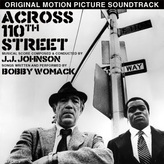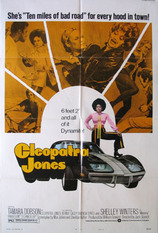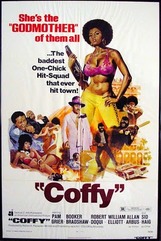Movies and Social Activism - Part One: The Blaxploitation Era
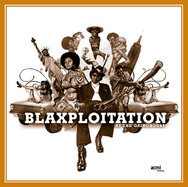
Blaxploitation is the term for a film genre of the Seventies.
Blaxploitation films were originally made specifically for an urban African American audience, although the genre's audience appeal soon broadened to cross racial and ethnic lines. The term was coined in the early 1970s by the Los Angeles National Association for the Advancement of Colored People (NAACP) head, and ex-film publicist Junius Griffin.
There are varying opinions on the social significance of these movies. While some held that the Blaxploitation trend was a token of black empowerment, the movies were accused by others of perpetuating common white stereotypes about black people. As a result, many called for the end of the genre. The NAACP, Southern Christian Leadership Conference, and National Urban League joined together to form the Coalition Against Blaxploitation. Through their influence, during the late 1970s, they contributed to the demise of the genre.
When interviewed by the Los Angeles Times in 2010, Pam Grier discussed her work during this era:
GB: At the time, blaxploitation films were very controversial, criticized for their violence and images. What do you think sparked a change in perception to the point that these films are now celebrated?
PG: They had a purpose. It was important for documenting what black people were doing. At the time, some people were horrified because they felt I was posturing as a man. But my rural background always included hunting and fishing. I was strong with firearms but proved I could also be feminine.
The music of this era was phenomenal. Isaac Hayes, Curtis Mayfield, Earth, WInd, and Fire, Bobby Womack, Roy Ayers, and others wrote the songs for the soundtracks of these movies. Many of these songs are still easily recognized and have been sampled over the years.
There were over 200 movies made during this period, a few of them are highlighted below. I hope that you enjoy the trailers and maybe find the desire to rent one.
There are varying opinions on the social significance of these movies. While some held that the Blaxploitation trend was a token of black empowerment, the movies were accused by others of perpetuating common white stereotypes about black people. As a result, many called for the end of the genre. The NAACP, Southern Christian Leadership Conference, and National Urban League joined together to form the Coalition Against Blaxploitation. Through their influence, during the late 1970s, they contributed to the demise of the genre.
When interviewed by the Los Angeles Times in 2010, Pam Grier discussed her work during this era:
GB: At the time, blaxploitation films were very controversial, criticized for their violence and images. What do you think sparked a change in perception to the point that these films are now celebrated?
PG: They had a purpose. It was important for documenting what black people were doing. At the time, some people were horrified because they felt I was posturing as a man. But my rural background always included hunting and fishing. I was strong with firearms but proved I could also be feminine.
The music of this era was phenomenal. Isaac Hayes, Curtis Mayfield, Earth, WInd, and Fire, Bobby Womack, Roy Ayers, and others wrote the songs for the soundtracks of these movies. Many of these songs are still easily recognized and have been sampled over the years.
There were over 200 movies made during this period, a few of them are highlighted below. I hope that you enjoy the trailers and maybe find the desire to rent one.
Sweet Sweetback's Baadasssss Song - 1971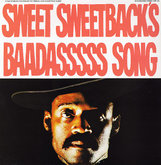
Produced, directed, scored, and starring Melvin Van Peebles, Sweet Sweetback's Baadasssss Song is credited with being one of the first, if not the first movie of the blaxploitation era. The movie was produced on a shoe string budget as no Hollywood studio would fund the project. Bill Cosby loaned Van Peebles $50,000 to complete the project. The overall budget for the movie was $150,000 and was filmed over 19 days. The domestic box office gross was $4.100,000. The musical score and soundtrack was performed by Earth, Wind, and Fire.
In 1971, Black Panther Party cofounder Huey P. Newton went to see Sweetback. Newton devoted an entire issue of the Black Panther Party’s newspaper to Van Peebles’s film—the first time the paper was ever given over to one subject in its entirely—the centerpiece of which was his long essay that analyzed the film from a revolutionary perspective. Newton soon made the film required viewing for every Panther member in every chapter across the country. |
|
Plot Summary: After beating a couple of white cops he witnessed brutalizing a local black revolutionary, sex show performer Sweetback has to go on the run. As he flees through decrepit South Central Los Angeles, Sweetback demonstrates his formidable potency through sex as well as violence, evading the police manhunt by any means necessary.
Shaft - 1971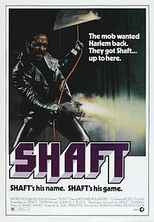
"Who is the man that would risk his neck for his brother man?" Directed by Gordon Parks, Jr., released by Metro-Goldwyn-Mayer, starring Richard Roundtree as John Shaft, Shaft received critical acclaim. Wikipedia reports "Shaft was well received by film critics and is considered by many as one of the best films of 1971. The film was one of only three profitable movies that year for MGM, grossing what Time magazine called an "astonishing" $13 million on a budget of $500,000. It not only spawned several years of "blaxploitation" action films, it earned enough money to save then-struggling MGM from bankruptcy." |
|
Shaft received numerous awards. Isaac Hayes won the Academy Award for Best Original Song and was nominated for a Golden Globe Award for Best Original Song for "Theme from Shaft". In 2004, the song was named the 38th greatest movie song of all time by the American Film Institute. Hayes also won a Golden Globe Award for Best Original Score, the Grammy for Best Original Score Written for a Motion Picture and was nominated for the Original Dramatic Score Oscar, as well as the BAFTA Award for Best Film Music. The film's score was also selected as a possible candidate for AFI's 100 Years of Film Scores. Richard Roundtree was nominated for the Golden Globe for Most Promising Newcomer (Male), and he also received an MTV Lifetime Achievement Award for his portrayal in the Shaft Trilogy. The character John Shaft was considered a possible candidate for AFI's 100 Years…100 Heroes and Villains. The film itself was also a candidate for AFI's 100 Years…100 Thrills.
In 2000, Shaft was selected for preservation in the United States National Film Registry by the Library of Congress for being "culturally, historically, or aesthetically significant". In 2003, Shaft was chosen as one of The 1000 Best Movies Ever Made by The New York Times.
Plot Summary: John Shaft is the ultimate in suave black detectives. He first finds himself up against Bumpy, the leader of the Black crime mob, then against Black nationals, and finally working with both against the White Mafia who are trying to blackmail Bumpy by kidnapping his daughter.
In 2000, Shaft was selected for preservation in the United States National Film Registry by the Library of Congress for being "culturally, historically, or aesthetically significant". In 2003, Shaft was chosen as one of The 1000 Best Movies Ever Made by The New York Times.
Plot Summary: John Shaft is the ultimate in suave black detectives. He first finds himself up against Bumpy, the leader of the Black crime mob, then against Black nationals, and finally working with both against the White Mafia who are trying to blackmail Bumpy by kidnapping his daughter.
Superfly - 1972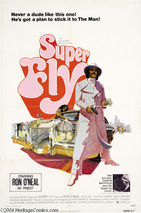
Directed by Gordon Parks, Jr., released by Warner Bros. starring Ron O'Neal as Youngblood Priest, Super Fly is one of the few films ever to have been outgrossed by its soundtrack.
The soundtrack, written and produced by Curtis Mayfield, was named the 63rd greatest album of all time by VH1 in 2003, Track number two, "Pusherman", has been selected among The Rock and Roll Hall of Fame's 500 Songs that Shaped Rock and Roll. In 2003, the album was ranked number 69 on Rolling Stonemagazine's list of the 500 greatest albums of all time. |
|
Some thought that the movie was controversial. At least one critic has suggested that the film's glorification of drug dealers serves to subtly critique the civil rights movement’s failure to provide better economic opportunities for black America and that the portrayal of a black community controlled by drug dealers serves to highlight that the initiatives of the civil rights movement were far from fully accomplished.However the filmmakers maintain that it was their desire to show the negative and empty aspects of the drug subculture. This is evident in the movie from the beginning as Priest communicates his desire to leave the business. Nearly every character in the film, with the notable exception of his "main squeeze," tries to dissuade Priest from quitting; their chief argument being that dealing and snorting are the best he ever could achieve in life.
Plot Summary: Super Fly is a cocaine dealer who begins to realize that his life will soon end with either prison or his death. He decides to build an escape from the life by making his biggest deal yet, converting the coke to cash and running off to start a new life. The problem is that the Mob does not have a retirement plan and will give him a choice of staying and selling for them or dying if they find out his intentions.
Plot Summary: Super Fly is a cocaine dealer who begins to realize that his life will soon end with either prison or his death. He decides to build an escape from the life by making his biggest deal yet, converting the coke to cash and running off to start a new life. The problem is that the Mob does not have a retirement plan and will give him a choice of staying and selling for them or dying if they find out his intentions.
Plot Summary: This film is set in Harlem, of which 110th Street is an informal boundary line. By-the-book African-American Lieutenant William Pope (Kotto) has to work with crude, racist but streetwise Italian-American Captain Frank Mattelli (Quinn) in the NYPD's 27th precinct. They are looking for three black men who slaughtered seven men—three black gangsters and two Italian gangsters, as well as two patrol officers—in the robbery of $300,000 from a Mafia-owned Harlem policy bank. Mafia lieutenant Nick D'Salvio (Franciosa) and his two henchmen are also after the hoods. Paul Benjamin plays the troubled Jim Harris, who is the last of the surviving robbers; he makes his choice in the emotional climax.
Critics of the blaxploitation industry complained that they were “dismayed by Tamara’s image as a karate-chopping, pistol popping terror.” In response Dobson replied “You go through phases until you find the right situation where a character works for you. A lot of tits and ass movies were made, ballbuster films, exploitation pictures. But I don’t care what anybody calls it. Doing Cleopatra Jones gave me a chance to work. I loved Cleo. She was not only gravious, but strong, clever, intelligent and sexy.”
Plot Summary: Cleopatra Jones is a United States Special Agent assigned to crack down on drug-trafficking in the U.S. and abroad. After she burns a Turkish poppy field, the notorious drug-lord Mommy is furious at the loss of her supply and vows to destroy Cleopatra Jones. Mommy uses her connections with bad cops on the force to cause trouble for Cleopatra's friends and set her up for an attack. Meanwhile, Mommy is having trouble with some of her pushers, like the renegade Doodlebug.
Plot Summary: Cleopatra Jones is a United States Special Agent assigned to crack down on drug-trafficking in the U.S. and abroad. After she burns a Turkish poppy field, the notorious drug-lord Mommy is furious at the loss of her supply and vows to destroy Cleopatra Jones. Mommy uses her connections with bad cops on the force to cause trouble for Cleopatra's friends and set her up for an attack. Meanwhile, Mommy is having trouble with some of her pushers, like the renegade Doodlebug.
|
|

